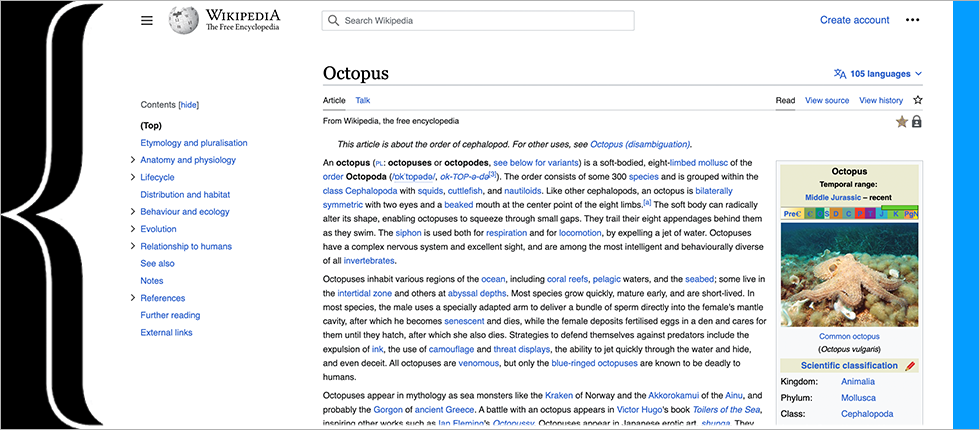The interface update, built in collaboration with Wikipedia volunteers worldwide, will make the site more welcoming, easier to use for everyone
Update: On 4 May 2023, the desktop update was deployed to Spanish Wikipedia. The updated interface is now live on 95% of the 318 active language versions of Wikipedia for all desktop users.
The Wikimedia Foundation, the nonprofit that operates Wikipedia and other Wikimedia projects, announced today the launch of Wikipedia’s first major desktop interface update in over ten years. The updated interface, which comes on the heels of English Wikipedia’s 22nd birthday (January 15), prioritizes usability and modernizes the Wikipedia experience to make it easier for everyone to access, explore, and share knowledge. The update is rolling out today on English Wikipedia and is already live on 94% of the 318 active language versions of Wikipedia for all desktop users.
In 2022, a global digital trends report revealed that the number of people who are not connected to the internet dropped below 3 billion for the first time. Wikipedia’s new desktop interface was designed to meet the needs of this next generation of internet users, making it easier for everyone, regardless of their familiarity with the internet, to find knowledge that is trustworthy and reliable. The desktop update, created in close consultation with Wikipedia readers and volunteer editors, is part of a steady series of improvements to the Wikipedia reading and editing experiences over the past several years across mobile and desktop devices.
“The Wikipedia desktop update is one of the major improvements the Wikimedia Foundation is making to help people easily access the world’s knowledge, in support of our mission to make sure every person on the planet has free and equitable access to knowledge, regardless of where they live or where they are from,” said Selena Deckelmann, Chief Product and Technology Officer at the Wikimedia Foundation. “The changes make it easier for people to find and learn from the work of our incredible volunteers. These features were created with feedback from readers and volunteers from all over the world, aiming to meet the needs of our increasingly diverse audience, while keeping the simple and straightforward feel that millions of people have come to trust over the last 22 years.”
The desktop update introduces a variety of new features, including:
- An improved search experience that now leverages images and descriptions that makes it easier to find articles on Wikipedia, leading to a 30 percent increase in user searches based on testing
- More prominently-placed language-switching tools that allow multilingual readers and editors to more quickly find their preferred language and switch between over 300 languages
- An updated sticky header with commonly used links such as Search, Page name, and Sections that move with logged-in users as they scroll. This allows users to focus on reading and editing, and reduces scrolling fatigue with user tests showing a decreased scroll rate of more than 15 percent
- A table of contents that provides context on the article and the ability to navigate throughout the reading experience
The updated Wikipedia interface does not remove any previous functionality. It instead introduces new tools to improve the existing website experience through enhancements based on consultation with Wikipedia volunteer editors, data analysis, and user testing.
More than 30 different volunteer groups from all over the world, ranging from India and Indonesia, to Ghana and Argentina, were engaged throughout conceptualization, product development, testing, and rollout. The improvements were further shaped by global research insights and user feedback. This collaborative model is unique to Wikimedia projects, which, unlike other online technology platforms, prioritizes building with users instead of just for them.
The Wikimedia Foundation remains committed to the core idea of knowledge equity. Through this central philosophy, the Foundation supports freely available knowledge for communities that have traditionally been excluded from structures of power and privilege, and works to break down the social, political, and technical barriers preventing people from accessing and contributing to free knowledge.
The updated desktop interface is a realization of our commitment to knowledge equity, and is part of ongoing work to better empower users and improve the experience of reading and contributing knowledge across the Wikimedia ecosystem. The Wikimedia Foundation is collecting feedback from new and existing Wikipedia users to continue developing a desktop experience that meets the needs of the growing global Wikimedia community.
About the Wikimedia Foundation:
The Wikimedia Foundation is the nonprofit organization that operates Wikipedia and the other Wikimedia free knowledge projects. Our vision is a world in which every single human can freely share in the sum of all knowledge. We believe that everyone has the potential to contribute something to our shared knowledge, and that everyone should be able to access that knowledge freely. We host Wikipedia and the Wikimedia projects, build software experiences for reading, contributing, and sharing Wikimedia content, support the volunteer communities and partners who make Wikimedia possible, and advocate for policies that enable Wikimedia and free knowledge to thrive. The Wikimedia Foundation is a United States 501(c)(3) tax-exempt organization with offices in San Francisco, California, USA.
Related resources:
- More information about the desktop update on the Foundation website
- The Wikimedia Foundation team behind the new look
- Survey link for feedback about the updated interface
Media Contact: Vidhu Goyal, press@wikimedia.org

